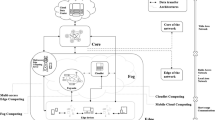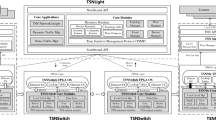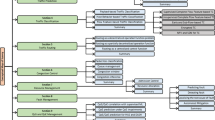Abstract
This paper presents a new index system for the performance evaluation and network planning of multimedia communication systems using measurement on actual systems to support several different traffic types. In this index system, we develop an expert system to evaluate the performance of such multimedia communication networks including channel utilization and call blocking probability and packet delay, and apply the network planning methods to optimize the networks and forecast the demand of the growing multimedia communications sytems. Two important planning problems for the multimedia communication systems are presented: optimization problem for construction of the world system and forecast problem for increasing traffic demands. We first discuss analysis methods, performance measures for the multimedia communication systems. Then, we describe network planning methods for the multimedia communication systems and give some efficiency network planning methods. Finally, we present some results studied in traffic forecast for the campus network and show the effectiveness of these methods.
Similar content being viewed by others
References
Gu, J. F. and X. J. Tang, et al., “WSR system approach to the study of synthetic evaluation of commercial information system in China”, Proceedings of the 3rd International Conference on Systems Science and Systems Engineering (ICSSSE’98, J. F. Gu, ed.), Beijing: Scientific & Technical Documents Publishing House, pp252–256, 1998.
Kleiner, B. R., “An integrative framework for measuring and evaluating information management performance”, Computer & Industrial Engineering, Vol.32, No.3, pp545–555, 1997.
Kleinrock, L., Queueing Systems, Vol. 1, New York: John Wiley & Sons, 1975.
Kleinrock, L., Queueing Systems, Vol. 2, New York: John Wiley & Sons, 1976.
Liang, X. J. and L. X. Li, Multimedia Communication Network Planning, Peoples’ P&T Press, Beijing, China, 2000 (in Chinese).
Pidd, M., Tools for Thinking: Modelling in Management Sciences (2e). Chichester: John Wiley & Sons, 2002.
Suganuma, T., S. Imai, T. Kinoshita, N. Shiratori, “A QoS control mechanism using knowledge-based multiagent framework”, IEICE Transactions, Vol. E86-D, No. 8, pp1356–1368, 2003.
Xin, Z. H., “Simulated annealing algorithm and its applications”, BUPT Journal, Vol.14, No.2, pp21–25, 1991 (in Chinese).
Yue, W., X. Wang, M. Koga and J. Gu, “Analytical methods to evaluate the performance of computer and communication networks for commercial business”, Proceedings of International Conference on Communication Technology (ICCT’98, Xue, C. P. ed.), Beijing, China, pp.S34-07-1–S34-07-5, 1998.
Yue, W., and Y. Matsumoto, Performance Analysis of Multi-Channel and Multi-Traffic on Wireless Communication Networks, Kluwer Academic Publishers, 2002.
Author information
Authors and Affiliations
Additional information
This work was supported partly by National Natural Science Foundation of China under Grant No. 79990583 and 70221001.
Wuyi Yue received her B.Eng. degree in electronic engineering from Tsinghua University, Beijing, China, in 1976, and the M.Eng. and Dr.Eng. degrees in applied mathematics and physics from Kyoto University, Kyoto, Japan, in 1986 and 1989, respectively. From April 1989 to January 1991, she was a researcher and from February 1991 to April 1991, a chief researcher of ASTEM RI, Kyoto, Japan; from April 1991 to March 1992 she was an associate professor of Wakayama University, Wakayama, Japan; from April 1992 to March 1996 she was an associate professor and from April 1996 to March 2001 she was a professor at the Department of Applied Mathematics of Konan University, since April 2001 she has been a professor at Department of Information Science and Systems Engineering, Faculty of Science and Engineering, Konan University, Kobe, Japan. Her research interests include queuing theory and its application to performance analysis and modeling of mobile radio communication networks and computer communication networks, performance evaluation of systems, systems engineering, operations research and information systems. Dr. Yue is a member of the IEEE, the IEICE of Japan, the Operations Research Society of Japan, System Engineers Society of China and the System Science Society of China, the Operations Research Society of China.
Jifa Gu received his bachelor degree in computational mathematics from Peking University in 1957 and doctoral degree in operations research in former USSR in 1963. He has been working at Institute of Mechanics, Institute of Mathematics, and later Institute of Systems Science in Chinese Academy of Sciences since 1957. He had long been engaged in research on operations research, multiple criteria decision analysis, evaluation, systems engineering, etc. He proposed the oriental Wu-li Shi-li Ren-li system approach. During 1994–2002, he served as the president of Systems Engineering Society of China. During May of 1999 to March of 2003, he served as a professor at Lab of Socio-Technical Systems, School of Knowledge Science, Japan Advanced Institute of Science and Technology (JAIST). His recent interests are system methodology, meta-synthesis approach and their applications. Now he serves as a professor in the Academy of Mathematics and Systems Sciences, China. He also serves as the president of International Federation for Systems Research since 2002 and vice president of International Society for Knowledge and Systems Sciences since 2003.
Xijin Tang got her bachelor degree from Zhejiang University in 1989, master degree from University of Science and Technology of China in 1992 and doctoral degree from Institute of Systems Science, Chinese Academy of Sciences in 1995. Now she is an associate professor in the Academy of Mathematics and System Sciences, Chinese Academy of Sciences. She had been to Georgia Institute of Technology as a research associate during 1998–1999 and JAIST as a visiting associate professor of “Fujitsu Chair for Science of Complex Systems” during 2000–2001. She has been engaging in research on decision support systems and system methodologies, and finished some practical projects on developing a variety of computerized support systems for water resources management, comprehensive evaluation on commercial information systems, naval weapon system evaluation, etc. during 1992–1998. Currently she is interested in research on meta-synthesis and complex system modeling, knowledge creation and support systems. She is a member of council of Systems Engineering Society of China since 2002, and International Society for Knowledge and Systems Sciences since 2003.
Rights and permissions
About this article
Cite this article
Yue, W., Gu, J. & Tang, X. A performance evaluation index system for multimedia communication networks and forecasting for web-based network traffic. J. Syst. Sci. Syst. Eng. 13, 78–97 (2004). https://doi.org/10.1007/s11518-006-0155-1
Issue Date:
DOI: https://doi.org/10.1007/s11518-006-0155-1




